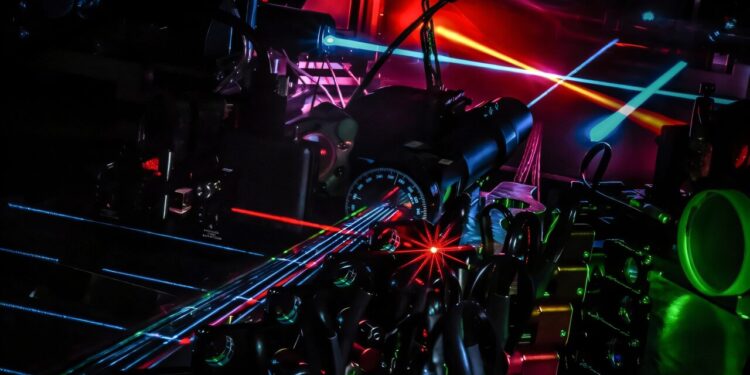Optics of the H2 quantum computer. Credit: Quantum.
Quantum computers, which treats information by taking advantage of quantum mechanical effects, have the potential to surpass conventional computers in certain optimization and calculation tasks. In addition, they could be used to simulate complex quantum systems that cannot be simulated using conventional computers.
Quantum researchers and other institutes in Europe and the United States have recently decided to simulate the digitized dynamics of the quantum model, a frame that describes quantum magnetism in materials, using an advanced quantum computer.
Their simulations, described in an article on the arxiv A pre -printed server led to the observation of a transitional state known as the Floquet pretlet, in which the systems appear locally stable before approaching complete balance, in diets inaccessible to conventional computers.
“The simulation of the evolution of continuous time on digital quantum computers has been a long-standing objective in the field of quantum calculation, so we are certainly not the first or only people who wish to do it,” Michael Foss-Feig, a researcher at Quannum and the main author of the newspaper, told Phys.org.
“However, reaching it on a scale that rivals or exceeds the best conventional methods is much more difficult than obtaining a quantum advantage in more artificial scenarios, such as random circuit sampling, and had not yet been achieved.”
Last year, Foss-Feig and its quantum colleagues successfully used a quantum computer that they developed to perform sampling tasks of random circuits which could not be carried out by conventional computers, with unprecedented loyalty. This achievement inspired them to explore the potential of quantum computers to finish a wider range of problems.
“These first results, as well as progress in our door loyalty in the past year, have convinced us to start thinking seriously about the question of whether quantum simulation could be at hand,” said Foss-Feig.
As part of their recent study, researchers used H2, a quantum computer developed in quantum, to simulate the dynamics of the quantum model. The quantum model is a standard model used to study magnetism, quantum phase transitions and emerging physics in complex systems.
H2 quantum computer system model. Credit: Quantum.
“In real systems, time passes smoothly and the simulation of realistic dynamics on a digital quantum computer requires” discretizing “this gentle time evolution in all the quantum doors that have been available,” said Foss-Feig. “The discretization is never perfect, but we have done so well to observe many characteristic characteristics of the real physical systems.
“In particular, the sweetness of time is ultimately responsible for the energy preserved in real systems, which makes them naturally relax to a state of equilibrium after being pushed away from the balance.”
The simulations managed by Foss-Feig and its colleagues digitally reproduce the dynamics continuously, thus showing how quantum systems evolve over time. In their simulations, researchers observed signatures characteristic of these systems when they approach a state of equilibrium, such as the emergence of a hydrodynamic energy transport.
“The most important realization of this work is that we have been able to maintain this evolution of continuous time relatively without noise (and therefore precise) on time scales where even the best classical simulation methods seem to be fighting,” said Reza Haghshenas, a researcher at Quantinium leading the classic bench efforts.
“I say” struggle “and not” stranded “, because we think that with substantial classic resources (that is to say, execute the best classic algorithms with super-computer resources), it may well be possible to perform comparable simulations in a classic way.
Digitization of an Ising quantum magnet. Credit: arxiv (2025). DOI: 10.48550 / Arxiv.2503.20870
This recent Foss-Feig and colleagues study shows the potential of quantum computers for the realistic simulation of complex quantum systems, which are difficult or impossible to simulate with conventional computers. Researchers are now working to advance and increase quantum computers, which could further strengthen their capacity to simulate quantum systems.
Their recent work shows that current H2 quantum computer door loyalties are already high enough to simulate physical systems in difficult to access regimes using conventional computers. Future quantum computers based on an even higher number of qubits could simulate even larger and more complex systems, which could in turn improve the understanding of their underlying physique.
“Moderate increases in system sizes (QUBIT numbers) should allow simulations which are more definitively out of reach of current classic methods, and we are very impatient to publish our next system, Helios, with 96 qubits,” added Foss-Feig.
“We consider this as an incredibly exciting moment. Many important technologies are emerged from our (limited) capacity to conventionally simulate quantum systems, and the progress of simulation methods can have general impacts: quantum computers can soon be able to validate and increase conventional simulations in parameters where conventional methods are unrealisable or unrelated.”
More information:
Reza Haghshenas et al, digital quantum magnetism on the border of conventional simulations, arxiv (2025). DOI: 10.48550 / Arxiv.2503.20870
Newspaper information:
arxiv
© 2025 Science X Network
Quote: Simulation of quantum magnetism with a digital quantum computer (2025, April 10) recovered on April 11, 2025 from
This document is subject to copyright. In addition to any fair program for private or research purposes, no part can be reproduced without written authorization. The content is provided only for information purposes.



